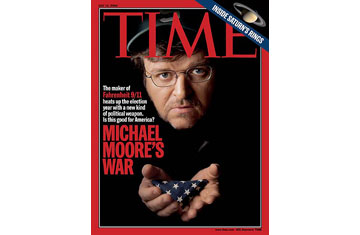
(5 of 7)
In Bowling for Columbine, he amplified his vision into an essay on the U.S. murder rate and attached it to a tragedy: the murder of 12 children and one teacher at a high school in Littleton, Colo. When he was given the Oscar for best documentary, Moore declared, in front of an uneasy audience and a billion TV viewers, "We live in fictitious times. We live in the time where we have fictitious election results that elect a fictitious President. We live in a time where we have a man sending us to war for fictitious reasons ... Shame on you, Mr. Bush. Shame on you."
The speech won him icy stares and undeniable celebrity as a fearless am-Busher. It helped propel his books Stupid White Men and Dude, Where's My Country? to the top of the best-seller lists. And it provided the emotional foundation for his latest, most audacious film. (At Cannes, Quentin Tarantino called Fahrenheit 9/11 "the first movie ever made to justify an acceptance speech.") By now Michael Moore, lone wolf, has morphed into Michael Moore Inc. And also Michael Moore, target. He is the subject of a book-length blast from the right, Michael Moore Is a Big Fat Stupid White Man, and a forthcoming documentary, Michael Moore Hates America. In political if not economic power, he is as big as the guys he used to track down.
"I went to The Passion of the Christ on the second night, and there were two people speaking in tongues; other people had their rosary beads out. In this country 50% of the people go to church on a regular basis. And they went to that movie. My film has a much broader cross section of moviegoers--people from the general public."
Fahrenheit 9/11 is The Passion of the Christ of the left. Both films established a base in a devoted minority: the evangelical right and the political left. Both films were attacked in the major media and profited from it: the faithful were galvanized, the films got an underdog status, and uncommitted moviegoers paid attention. As church groups recruited members to attend Mel Gibson's film its first weekend, so too the liberal lobby MoveOn.org signed up 110,000 members who pledged early attendance at the Moore movie.
Hit movies typically breed clones. And in this election year, with stakes and tempers high, a potent nonfiction genre is emerging: the agit-doc, dealing with high-octane political issues, often in a confrontational tone. Trailing Moore's box-office clout, agit-docs are surging into the mainstream. One of them, The Hunting of the President, co-directed by Clinton pal Harry Thomason, was originally to go to 30 theaters; now its distributor has revved that number to 125 and has put the film's trailer on many screens showing Fahrenheit 9/11.
"We've underestimated the audience's desire to see [political] material," says Robert Greenwald, director of Uncovered: The War on Iraq, a sober and devastating critique of Bush's foreign policy. "I don't think it's about hating the President. It's that politics has been brought home to the deepest part of ourselves. People now feel Politics Is Me."
"I don't like this film being reduced to Bush vs. Kerry. The issues in it are larger than that ... When Clinton was President, I went after him. And if Kerry's President, on Day Two I'll be on him."
